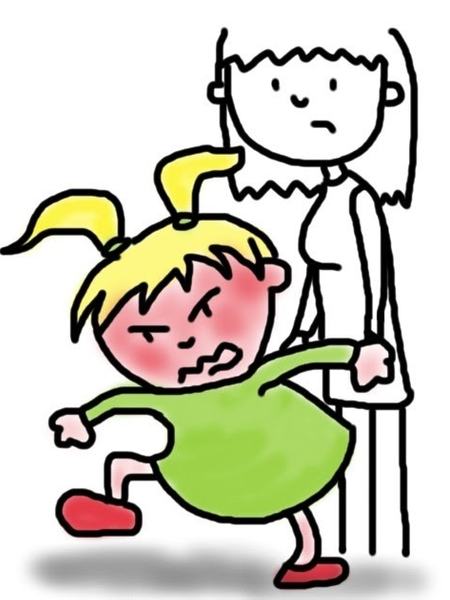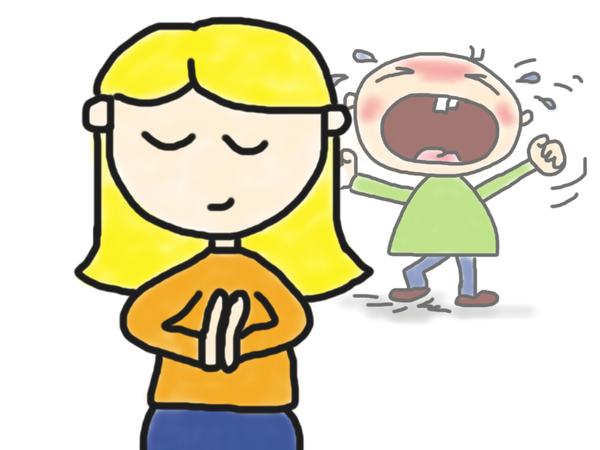Bye bye tantrums - Stay cool as a parent with these 5 tips!
Can your child get angry sometimes?
Most certainly - in fact, I'd argue that anyone can, big or small.
Tantrums are a part of life and can be very stressful and challenging for you as a parent. In this blog article, I want to help you better understand your child's emotional world and show you how to respond appropriately to a tantrum.

Anger does good?!
Children are still deep in their development and learn a lot from experiences, behaviors, learning from the model, etc....
For you as a parent, it is important to accompany your child's emotional world with empathy.
Because your child experiences a lot of frustrations in his everyday life, which can lead to anger. To you as an adult, the anger triggers may be small and trivial, but to your child they are very meaningful.
When your child is angry, he or she does not yet have the necessary brain maturity to handle this overwhelming emotion appropriately. The strong emotion fully engulfs your child. Thus, your child does not yet have the ability to self-regulate and needs you as a calming influence.
If your child's anger is perceived as a bad and undesirable emotion and therefore tends to be repressed, it can quickly lead to even more aggression or to actions that you as mom/dad will regret (e.g. something breaks, someone gets hurt, etc...).
Therefore, it is incredibly important that you, as a mom or dad, are sensitive to the child's needs and do not make expressing the feeling of anger taboo. The rule here is: Your child should learn to express his or her anger or even rage in a healthy way.
Where does anger come from?
Children can become angry for a variety of reasons. Often it is an expression of frustration when they are restricted in their actions or their needs are not met.
Do you know the triggers of your child's anger? The following challenges can lead to your child's anger:
- Overtiredness
- Hunger
- Emotional stress such as sadness or fear
- Health impairment/pain
- Excessive demands in area XY of life that the child is unable to cope with
- Lack of attention, closeness or time for the child
- Frustration due to unmet needs or wants
- Conflicts with siblings / other family members
- Changes in the family such as moving, separation, death,....
- Stress / pressure at daycare or school, e.g. pressure to perform, conflicts, bullying,...
- Personal characteristics such as temperamental or impulsive behavior
- Unclear rules or expectations in the family (e.g. lack of routines)
- Tensions between parents
This list of triggers can be continued indefinitely. Often, not only does one point apply, but the sum manages to flip the switch for a tantrum. The possible triggers can hide in plain sight for a long time, for example, if the child can neither categorize nor verbally express persistent feelings of discomfort (if he or she can't speak well yet or is also a bit quieter and doesn't want to talk much).
How you can figure out the triggers? Here are some approaches:
- Talk to your child in a safe setting. Please, not in those places, situations where tantrums happen again and again. For example, go for a walk in the woods and reflect together on a past tantrum.
- Have your child write down or draw what makes him or her angry.
- Use emotion cards or picture books and compare the emotion of anger to other emotions, such as sadness, fear, joy, etc.
- Talk to contacts who may also experience your child's anger e.g. teacher, caregiver, neighbor, grandparent, aunt/uncle, etc.
- Play with your child e.g. with stuffed animals. You can lovingly portray tantrums. When your child plays along, let your child take the lead and only ask questions now and then that might ev reflect reality.
Now that you know how anger builds up in your child and then erupts, you can work on the tantrum situation itself and support your child peacefully.

I have now summarized some tips for you on how to support your child's anger. These will help you to channel your child's anger and express it appropriately. This will make your family life more relaxed and harmonious:
1. calmness
It's easier said than done, but it's important as a parent to stay calm even when your child gets angry. Take a deep breath and try to calm down before you even react.
2. don't take the tantrum personally
It's often the famous straw that breaks the camel's back. If you argue about this drop, you will not find a solution. During the tantrum, try to focus only on the fact that this strong emotion will pass again.
3. understanding
Make your child feel that you understand why he is angry. Let him finish and show interest in his feelings, e.g., through eye contact, head nodding, sympathetic facial expressions, etc. Encourage communication by also showing a willingness to talk.
4. set limits
While allowing your child to express his anger, it is important to also clearly set your personal boundaries. For example, you can say, "I understand you're angry, I'll make sure everyone stays safe. Come on I'll hold the pillow for you, you can hit it."
5. less is more
Try to contain your torrent of words. Because your child can't take in much at all in such a strong emotion. Your child is not receptive to rational and logical explanations.
To prevent tantrums, you can offer your child sufficient compensation. Ask yourself what compensation your child has for the everyday demands, such as kindergarten/school, adherence to the values and norms of society (e.g. eating rules, hygiene regulations, etc...). Think about where the child is allowed to act in a cooperative and self-determined way and where everywhere your child is determined by others. How much does your child already cooperate in everyday life and how much does he/she have to suppress his/her own needs?
It is best to ask yourself these questions and include your child's interests and strengths:
- What rules/agreements/regulations does my child have to follow on a daily basis? This can range from brushing teeth to homework and other "obligations."
- Is there any compensation for this?
- Does this compensation offer some form of physical activity?
- Can your child really switch off from the daily demands with the help of this compensation?
- Would some other form of compensation be possible?
- Where can I allow my child more creative opportunities?
- In what areas can I turn "no's" into "yes's"?
Last but not least, keep in mind that your child can learn a lot from you. As a parent, you should demonstrate how to resolve conflicts in a constructive way. Of course, this doesn't always work out, because NOBODY is PERFECT! If you have become angry yourself, apologize to your child and show that you have now also become much too loud. Acknowledge your uncontrolled outburst of anger. Say, for example, "I'm sorry, now I've gotten really loud, too. I didn't mean to. The next time I'm angry, I'll gasp first. I'm also learning a lot right now about how to deal with my anger."
If it escalates every day and several times over a long period of time:
Recognize when it's time to seek professional help. If your or your child's anger is getting out of control and you are just feeling overwhelmed, don't be afraid to get support.
Summary
Be sure to be generous to yourself as well, and even if you make mistakes as a parent. It's all about how you handle your mistake - and do it openly and honestly. Be aware that talking openly about your anger also gives your child a lot more options.
Because it makes your child realize that all feelings are okay and welcome. This will strengthen his maturity, self-control and body awareness, which is enormously important at different stages of development - regardless of your child's age.
Learn from your mistakes and take responsibility for your emotional outburst. By doing so, you can make up for a lot of things and "repair" your relationship.
Image sources
The cover image is from unsplash.com.
The images in the article were provided to me by the author Birgit Gattringer from starkekids.com.
No comments yet.